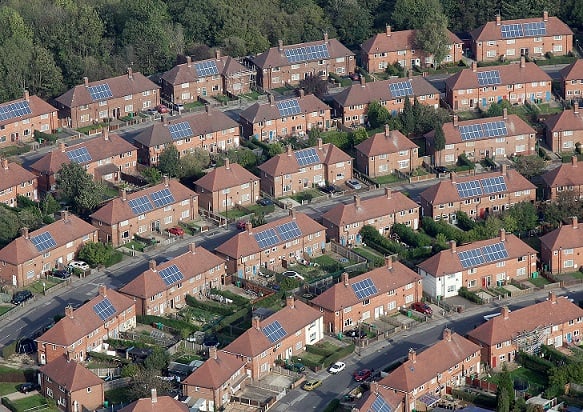
Image: Nottingham City Council.
The government’s Smart Export Guarantee (SEG), its eagerly awaited replacement for the soon-to-close export tariff, has been dubbed both a “new era” for solar and a “mountain to climb” as the proposals received a mixed response.
The government has backed the scheme to be transitional for the small-scale renewables sector. Claire Perry, the government’s energy and clean growth minister, said the scheme could help “build a bridge” to the smart energy system of the future, simultaneously placing consumers “firmly at its heart”.
“It could also reduce strain on energy networks with a more decentralised and smarter local network delivering resilience much more cost-effectively, unlocking innovative products for electric vehicles and home energy storage; a win-win for consumers and the environment and a key part of our modern Industrial Strategy,” she said.
On a similar tack, the Renewable Energy Association’s James Court said the scheme could “usher in a new era” for small-scale renewables, remarking how the trade body had strongly supported the implementation of a market-based solution.
“Whilst the details around the transition from the former subsidy scheme will be important, this signal of support for the sector from government will help our members continue to provide smarter, cleaner and cheaper electricity in the decade to come,” he said.
The proposals have also received backing, albeit cautiously, from the Solar Trade Association, whose chief executive Chris Hewett said it was a positive development that the government had acknowledged barriers to the industry the association had raised and the need for a system sell price to accurately reflect market value.
Onus on the suppliers
Hewett did also, however, have words of warning for how the market barriers could impact on the tariffs on offer. “Our worry is that these may impede the ability of suppliers to offer fair and meaningful rates, even though they may wish to. Customers are freely able to switch suppliers in a competitive market so where these costs fall remains vital to developing meaningful offers,” he said.
The mechanism will require energy suppliers to determine both the prices and lengths of any contracts. There will be no levelisation, meaning that the costs of implementing and managing all the required due processes and organisation of the tariffs will need to be reflected in the tariffs themselves.
Solar PV exports are currently priced at 5.24p/kWh under the export tariff, which is broadly similar with the average wholesale power price for 2018 which amount to 5.71p/kWh, according to Drax Electric Insights.
Electricity suppliers have yet to comment on the proposals, but the matter was picked up by Lawrence Slade, chief executive at trade body Energy UK, which represents the country’s energy suppliers. He said it would be crucially important to ensure remuneration is fair and that the obligations placed upon suppliers under the SEG are applied consistently “so not to create distortions”.
“We are looking forward to working with government, as it is vital that our sector supports the development of small-scale low carbon generation in order for us to achieve our climate change goals,” Slade said.
Cliff edges and time frames
There has however been considerable criticism for how the government is to allow the export tariff to close prior to a replacement mechanism’s implementation, creating what the proposals refer to as a “hiatus period”. In a statement issued in response to the consultation Community Energy England placed its scepticism over when the SEG could be ready, suggesting that while this Autumn would be a “best case scenario”, sometime next year would be more likely.
CEE stressed that in the absence of the feed-in tariff, community energy projects could continue to struggle. “Without additional support mechanisms for community energy, the continued focus on market-based solutions will significantly increase the risk and reduce margins for many community-led projects,” the association said.
But perhaps the most stinging criticism of the proposals came from the shadow cabinet. Rebecca Long Bailey, Labour’s shadow business minister, said that in ending the export tariff without a ready-made replacement, the government was “pushing an already struggling solar industry off a cliff edge”.
“These proposals – which are unlikely to be in place by the time the export tariff closes – present a new mountain for small-scale renewable energy to climb.”
Long Bailey also slammed the inner workings of the mechanism itself, deriding them as “hugely complex”.
“Rather than a simple flat payment for energy exported to the grid, the government is proposing a hugely complex market mechanism in which large energy companies – notorious for overcharging consumers billions of pounds – can offer whatever sum they deem fit to households. Furthermore, participation relies on possession of a smart meter which, due to the government’s bungled delivery of the smart meter programme, many households will not have for some time.”

